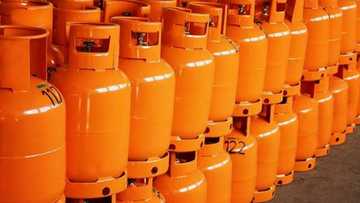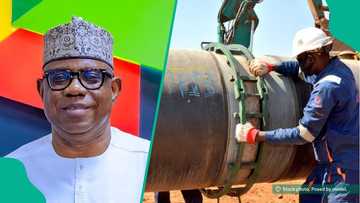New Report Says NNPC Could Lose Half of Its Production by 2030, Gives Reasons
- The NNPCL faces a potential 50% decline in oil and gas production by the late 2030s due to an overreliance on non-operated, sub-commercial assets and a lack of new projects
- Despite ambitious targets set by President Tinubu's administration to boost production and investment by 2030, infrastructural challenges and high operational costs threaten these goals
- Wood Mackenzie highlights the urgent need for NNPCL to improve its project pipeline and cost competitiveness to ensure long-term viability and growth
Don't miss out! Join Legit.ng's Sports News channel on WhatsApp now!
Legit.ng journalist Zainab Iwayemi has 5-year-experience covering the Economy, Technology, and Capital Market.
By the late 2030s, the Nigerian National Petroleum Company Limited (NNPCL) may lose up to 50% of its oil and gas production, according to a recent report by the international energy research firm Wood Mackenzie.

Source: Getty Images
The consulting firm claimed in its most recent podcast, "A New Era for NNPC and Nigeria's Upstream Oil & Gas Sector," that NNPCL's portfolio is overburdened by numerous sub-commercial assets, raising questions about its long-term viability.

Read also
Bismarck Rewane highlights how Dangote's N720bn initiative will lower inflation, boost economy
The evaluation follows Mele Kyari's resignation as Group CEO and coincides with new goals set by the administration of President Bola Tinubu to strengthen Nigeria's upstream industry.
NNPC's oil output to decline
Wood Mackenzie's team of experts, which included Ian Thom, Research Director for Upstream; Neivan Boroujerdi, Director of Corporate Research; and Mansur Mohammed, Head of West Africa Upstream Content, used its new upstream benchmarking tool to highlight that although production may improve slightly in the short term, output is predicted to peak by 2026 before sharply declining.
“What is unique to NNPC is that, unlike many other National Oil Companies within our corporate universe and around the world, most of its production and assets are non-operated.
“So it has big ambitions to grow its business and the Nigerian upstream sector, but much of that will rely on other IOCs around the world and indigenous producers, where assets will have to compete for capital within a wider portfolio.
“And if we look at production in more detail, we can see that it is growing in the short term. That’s set to peak in 2026. But clearly, there are challenges in the longer term. By the late 2030s, production could be half of what it is today,” the team stated, citing a lack of project pipelines and an over-reliance on non-operated assets.

Read also
Good news for Student Entrepreneurs as FG partners BoI to launch N50 million fund, details emerge
Wood Mackenzie pointed out that NNPCL's production is mostly reliant on assets run by foreign and domestic oil corporations, in contrast to other national oil companies that have greater operational control. This increases its sensitivity to capital allocation choices made outside Nigeria and restricts its capacity to directly influence output growth.
“So there is a lack of longevity in the portfolio. It needs more projects in the pipeline. And if we look at the reserve base, what you see is that NNPC has a huge amount of resources within its portfolio, but most of those resources are still sub-commercial. NNPCL has big ambitions, but its future hinges on how much capital other players are willing to invest in Nigeria,” the analysts said. “Right now, there’s a lack of longevity in its portfolio. It needs new commercial projects urgently.”

Source: Getty Images
Tinubu's goal for NNPC by 2030
President Tinubu has tasked the NNPCL management, led by Group Executive Chief Officer Bayo Ojulari, with achieving an ambitious set of goals by 2030, including raising oil production to 3 million barrels per day, gas output to 10 billion cubic feet per day, attracting $60 billion in investment, and refining 500,000 bpd domestically.
However, Wood Mackenzie says that financial obstacles and structural inefficiencies could undermine these goals.
Wood Mackenzie identified long-standing infrastructural limitations as a significant roadblock to gas production. According to the report, Nigeria has substantial undeveloped gas reserves, particularly in the Niger Delta. However, because of inadequate processing and transportation facilities, less than 20% of the remaining volumes are deemed commercially viable.
“For instance, the OB3 pipeline, which should connect gas fields in the Eastern Delta to Lagos and other markets, has faced years of delay. Its completion could be a game changer,” the report said.
Another issue is operational expenses; according to Wood Mackenzie's benchmarking tool, NNPCL has a higher cost base than its competitors due to a number of variables, including insecurity, barrel losses, and legislative difficulties such as local content laws.
“The company must urgently address its cost competitiveness, especially if it wants to attract investors or consider an Initial Public Offering in the future,” the team warned.
NNPC speaks on capacity of PH refinery
Legit.ng earlier reported that the Nigerian National Petroleum Company Limited confirmed that, contrary to what the Petroleum Products Retail Outlets Owners Association of Nigeria (PETROAN) claimed, the old Port Harcourt is currently operating at 90% capacity.

Read also
FG partners billionaire's firm to distribute 5 million LPG cylinders as cooking gas prices crash
PETROAN said on Thursday that the refinery is now running at 70% of its installed capacity, with plans to ramp up to 90%.
Although the refinery's nameplate states that it can produce 60,000 barrels of oil per day, ChannelsTV reported that a statement issued by NNPCL spokeswoman Olufemi Soneye on Friday, November 29, stated that it is currently operating at 90% capacity.
Proofreading by James Ojo, copy editor at Legit.ng.
Source: Legit.ng



